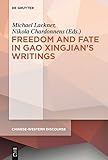Polyphony Embodied - Freedom and Fate in Gao Xingjian’s Writings / ed. by Michael Lackner, Nikola Chardonnens.
Material type: TextSeries: Chinese-Western Discourse ; 1Publisher: Berlin ; Boston : De Gruyter, [2014]Copyright date: ©2014Description: 1 online resource (262 p.)Content type:
TextSeries: Chinese-Western Discourse ; 1Publisher: Berlin ; Boston : De Gruyter, [2014]Copyright date: ©2014Description: 1 online resource (262 p.)Content type: - 9783110346428
- 9783110374179
- 9783110351873
- 700
- PL2869.O128 Z785 2014
- PL2869.O128
- online - DeGruyter
- Issued also in print.
| Item type | Current library | Call number | URL | Status | Notes | Barcode | |
|---|---|---|---|---|---|---|---|
 eBook
eBook
|
Biblioteca "Angelicum" Pont. Univ. S.Tommaso d'Aquino Nuvola online | online - DeGruyter (Browse shelf(Opens below)) | Online access | Not for loan (Accesso limitato) | Accesso per gli utenti autorizzati / Access for authorized users | (dgr)9783110351873 |
Frontmatter -- Acknowledgments -- Contents -- Illustrations -- Introduction -- Freedom and Literature -- Gao Xingjian’s Transcultural Aesthetics in Fiction, Theater, Art, and Film -- The Aesthete as Revolutionary: Saving Art from Politics -- The Silence of Buddha: Triangulating Gao Xingjian, Brecht, and Beckett -- Gao Xingjian’s Notion of Freedom -- Reading Gao Xingjian’s Treatment of Freedom in Soul Mountain and One Man’s Bible in the Sartrean Framework -- The Concept of Freedom in Gao Xingjian’s Novel One Man’s Bible -- Sex, Freedom, and Escape in Gao Xingjian’s One Man’s Bible -- Wild Man and the Idea of Freedom -- Toward an Aesthetics of Freedom -- Gao Xingjian Carefree: Of Mountains and Seas and Carefree as a Bird -- Tradition and Freedom: The Artistic World of Gao Xingjian and His Play Hades -- Multivocality as Critique of Reality: Fate and Freedom in Gao Xingjian’s The Man Who Questions Death -- Between Memory and Forgetting: Ten Years after Gao Xingjian’s Winning of the Nobel -- Finding Freedom and Reshaping Fate: An Exile’s Disentanglement from Obsession in Gao Xingjian’s Novels -- Fate as (Re)Visioning of the Self in Soul Mountain -- Trap Revisited: The Man Who Questions Death and the Tragedy of Modern Man -- Index of Works by Gao Xingjian -- Name Index
restricted access online access with authorization star
http://purl.org/coar/access_right/c_16ec
Like artists, important writers defy unequivocal interpretations. Gao Xingjian, winner of the Nobel Prize in literature, is a cosmopolitan writer, deeply rooted in the Chinese past while influenced by paragons of Western Modernity. The present volume is less interested in a general discussion on the multitude of aspects in Gao's works and even less in controversies concerning their aesthetic value than in obtaining a response to the crucial issues of freedom and fate from a clearly defined angle. The very nature of the answer to the question of freedom and fate within Gao Xingjian's works can be called a polyphonic one: there are affirmative as well as skeptical voices. But polyphony, as embodied by Gao, is an even more multifaceted phenomenon. Most important for our contention is the fact that Gao Xingjian's aesthetic experience embodies prose, theater, painting, and film. Taken together, they form a Gesamtkunstwerk whose diversity of voices characterizes every single one of them.
Issued also in print.
Mode of access: Internet via World Wide Web.
In English.
Description based on online resource; title from PDF title page (publisher's Web site, viewed 28. Feb 2023)


